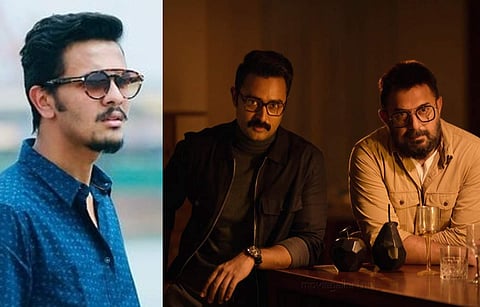

Vishnu, the lead character from Karthick Naren’s recent film, Project Agni, from Navarasa, ‘drifts’ back in time and alters his life. If he had such a power, Karthick says he would talk to his younger version. “I would tell myself that the journey is long and arduous, and it is vital that I stay strong!" This young filmmaker has already seen his share of tribulations, especially concerning the release of one of his films, Naragasooran. "I owe all my learning and maturity to Naragasooran," begins Karthick Naren. "After the success of my first film, I thought the road ahead was clear. I couldn't have been more wrong."
Excerpts from the conversation:
How did you get chosen to handle the rasa, Adbutha (wonder)?
I was one of the earliest filmmakers to get on board. As soon as I learnt that the anthology is based on Navarasas, I volunteered to handle Adbutha as I had already written the outline for Project Agni. I had pitched the idea to Arvind Swami sir three years back when we were shooting for Naragasooran. We then roped in Prasanna to play Krishna as we needed someone to match the charisma of Arvind sir.
Any emotion (rasa) you did not want to make a film on?
Haasya! Humour is a tricky genre to pull off. It may sound hilarious on paper but might not get translated well on screen. Drawing humour from actors needs a special kind of skill and I am working on it.
Save for Project Agni, all your directorial work, from your short film days, has either had a cop as the protagonist or is about a police case. What’s your fascination with this subject?
The script should place the audience in the shoes of somebody during runtime. Whenever there is a crime like murder involved, the police becomes the first audience within the story. We travel with them and discover the story. I like the immersion it creates.
Your scripts don’t seem to allow prominence for women characters…
I am aware of the criticism. I write a character only if it is needed in a narrative. For instance, in Mafia, I wanted to design the film as a thrilling cat and mouse game, without any deviations, that's the reason why I didn't have a subplot for the love story of Aryan and Sathya. But I tried to incorporate Priya Bhavani Shankar's character as much as possible within the narrative. I am evolving as a filmmaker and hope that my future films will feel balanced to all audiences.
Talking about Mafia, the extensive usage of slow-mo shots got mixed reactions.
I wanted them to be the signature of the film. I am a huge fan of 300, which is famous for its high-speed shots. I wanted to employ that style in Mafia. As for the story, the version you saw on screen is a short one. The original draft was longer, and the climax reveal in the theatrical version was supposed to be the interval. We weren't able to shoot the rest of the portions due to logistical reasons.
Tell us about the inception of your scripts.
It’s all about that one idea that is interesting enough to make me invest a year of my time. Actors and technicians move to the next project once they have completed their part for the film. But a director-writer like me lives with the film till its release date. So, the idea needs to be exciting.
Does your young age create any challenges?
I faced a lot of rejection because of my age, till the release of Dhuruvangal 16. The success of the film changed perceptions about me. But yes, I do face more pressure than older filmmakers. I also think I will get better at handling things, as the years pass by. Nevertheless, I am going with the flow and taking all my learnings seriously.
People used to associate age with talent when I debuted. But of late, things are changing for the good. Production houses are trusting young directors and I know for a fact that a lot of youngsters in their 20s are going to make their directorial debut soon.
Do you see yourself making a 'masala' film?
Delivering success with a commercial masala film has to be the toughest challenge for a filmmaker, as the product must satisfy audiences across age, region and background. I will take some time before setting my foot in that arena. Also, the audience is used to a certain type of commercial cinema, and change cannot happen overnight. If I give something that is in contrast with their expectations, they may not accept it.
Will Maaran be a Karthick Naren or Dhanush film?
I think it will be a mix of both (laughs). It is shaping well, and we are working on our final schedule. I am aware of the elements that the audience expects in a Dhanush film, but I have also made sure that my signature touches are in it. Dhanush sir, in fact, never asked me to tweak anything in the film. He greenlit the synopsis back when I was shooting for Mafia, and I wrote the story keeping him in mind. He has given his fullest to fit into my world.
We heard that Naragasooran is gearing for a direct OTT release. Is your other film, Naadaga Medai, still on?
Naadaga Medai hasn't been shelved; it is on hold as of now. It is a script close to my heart and I would love to shoot it when its time comes. Yes, Naragasooran is getting an OTT release; you will hear an announcement about it soon. I have also initiated talks for my next directorial with a couple of production houses. As of now, I can assure you that they will be nothing like my previous work.